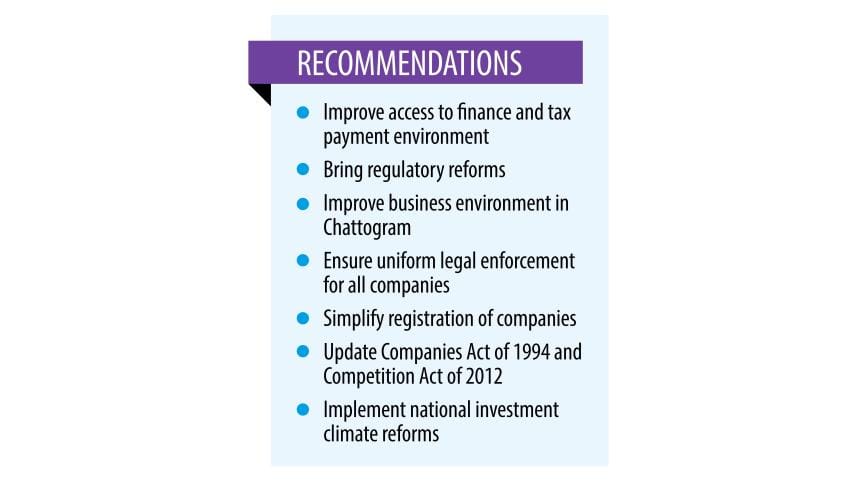Business environment worsens for sluggish reforms

The business environment in the country deteriorated slightly in 2023 compared to a year ago mainly because of sluggish regulatory reforms, weak infrastructure, and difficulty in access to finance, according to the Bangladesh Business Climate Index (BBX).
Measured on a scale of 0-100, the index fell to 58.75 last year from 61.95 in 2022, according to the BBX 2023-24 launched yesterday by the Metropolitan Chamber of Commerce and Industry (MCCI) and the Policy Exchange Bangladesh (PEB). This is the third edition of the BBX.
"Significant reforms are required," said PEB Chairman M Masrur Reaz, while presenting the findings at a programme at the MCCI Gulshan office in Dhaka.
The survey was conducted among 520 small, medium and large enterprises.
Eleven major pillars, namely starting a business, access to land, availability of regulatory information, infrastructure, labour regulation, dispute resolution, trade facilitation, paying taxes, technology adoption, access to finance, and the environment, were considered in the study.
Access to land, trade facilitation, and technology adoption are the only three areas of the investment climate that witnessed improvements. On the other hand, seven out of 10 pillars that have been considered in the previous BBX and the BBX 2023-24 suffered deterioration.
"The worst-performing areas are access to finance and the tax payment environment. A drastic reform is required in these areas immediately," Reaz told The Daily Star after the launch of the findings.
Moreover, although there are good laws, the challenge of enforcement remains. And the same law is applied differently to different companies even when the cases are similar, he said.
In Bangladesh, Dhaka and Chattogram are the two main economic growth centres. However, the business climate in Chattogram has got worse in the last three years and the government needs to pay heed to this, according to Reaz.
"If the business environment in the country's commercial capital does not improve, Bangladesh will hardly be able to harness the benefits of businesses, trading activities will not operate well while investments will not pick up."
He said there is a need to target field-level service delivery arrangements of regulators.
The BBX 2023-2024 report evaluates the comprehensive business environment, the ecosystem, uncertainties, disruptions in the global supply chain, and the escalating geopolitical tension arising from the Russia-Ukraine war and the Israel-Hamas war, said MCCI President Kamran T Rahman.
"The study now encompasses 12 key industrial sectors aiming to identify the right policies and reforms to stay competitive in the global market. It will assist investors and policymakers with industry-specific action programmes."
Salman Fazlur Rahman, private industry and investment adviser to the prime minister, said almost all indicators posted a decline and this was disappointing.
He admitted that there are major challenges in the tax payment environment and regarding the National Board of Revenue.
The adviser said he has always supported widening the tax net and reducing the tax rates to generate more revenue since the government is facing a tight fiscal situation.
Nihad Kabir, a former president of the MCCI, called for making tax payments hassle-free for the business community.
Zaved Akhtar, president of the Foreign Investors' Chamber of Commerce and Industry, emphasised "three Cs" -- credibility, consistency and capability -- of policies to attract more foreign direct investments.
"For instance, if a new company wants to do business here, it requires 150 approvals to start a venture."
He described the tax framework as complex and the VAT framework as complicated. "There is a need to simplify tax payments."
Yuji Ando, country representative of the Japan External Trade Organisation (Jetro) in Bangladesh, said 62 percent of Japanese companies operating in the country want to expand their footprint as they see the country as a promising destination to do business.
Previously, the ratio was 72 percent, meaning a decline. "Still, the number looks good," he said.
The companies reported that they faced an unfair legal system as well as difficulty in registering names with government offices, according to Ando.
For instance, Toyota, the Japanese multinational automotive manufacturer, registered its name in Bangladesh as Toyota Trading, but this is not the original name of the company, he cited.
Lokman Hossain Miah, executive chairman of the Bangladesh Investment Development Authority, also spoke.



 For all latest news, follow The Daily Star's Google News channel.
For all latest news, follow The Daily Star's Google News channel.
Comments